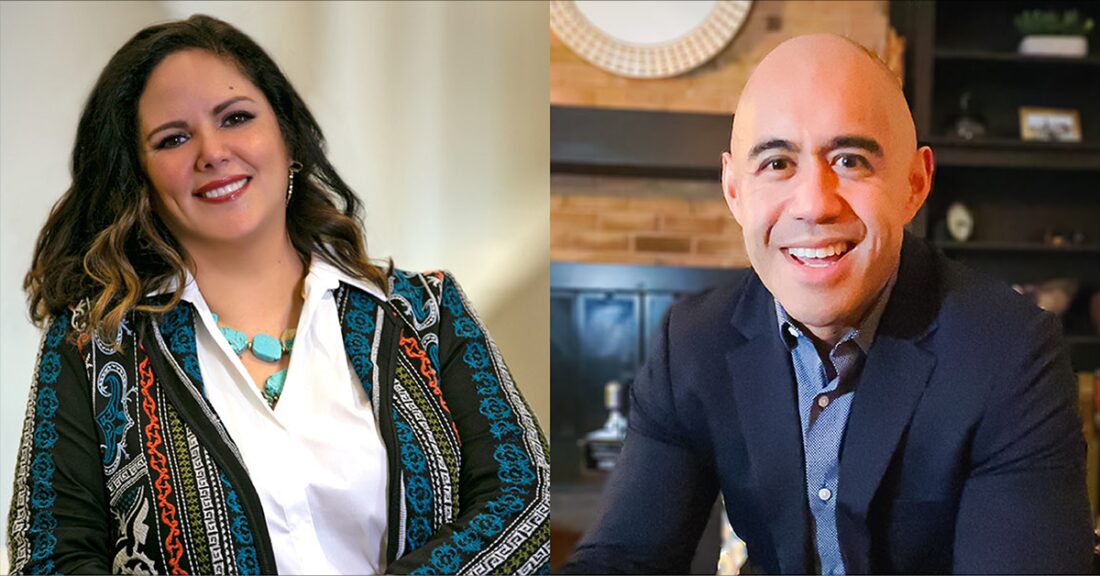How Two Leaders Use Results Count Skills to Help Others — Even as They Change Jobs

Results Count®, the Casey Foundation’s unique approach to leadership development, provides individuals with skills and tools they can apply not only to their current work on behalf of children and families but also to future positions with new organizations. Jessica Mindnich and MacArthur Antigua — both introduced to the skills and tools through one of Casey’s leadership engagements — are examples of social sector leaders who have deepened their expertise to become advanced practitioners of Results Count as they’ve moved on in their careers. To become more advanced practitioners, they participated in Casey offerings that dove deeper into the framework’s competencies and skills, including how to share the framework with others.
“Once a leader has internalized Results Count, they see the world through an equitable results lens that is hard to unsee,” says Jennifer Gross, a senior associate with the Foundation. “When these leaders transition to new roles, they look for effective ways to incorporate that way of seeing, thinking and being within their new systems.”
Becoming A Different Leader
Mindnich first learned Results Count skills in 2014, at Casey’s Leadership Institute for State-Based Advocates. Then director of research at Children Now, the California grantee in the Foundation’s KIDS COUNT® Network, she learned about ways of accelerating measurable change for children, youth and families, including Results Count’s five core competencies and two foundational frameworks.
She enhanced her application of Results Count as director of strategic learning and evaluation at the San Francisco Foundation, a Results Count hub. While there, she participated in the Results Count Advanced Practitioners Program, which gave her more experience with the framework. Her work at the San Francisco Foundation included collecting data and analyzing it by race and ethnicity to ensure that the foundation was advancing its overall goal of promoting equity and economic inclusion in the Bay area.
Mindnich regularly guided colleagues through a factor analysis to understand the story behind the numbers to help identify what specific areas to target in their strategies, including what to do more of, do less of or do differently. She also helped staff members build their Results Count skills and capacities to fulfill the foundation’s mission.
In 2020, Mindnich joined the Ewing Marion Kauffman Foundation as the senior director of evaluation, learning and impact stories. Working closely with senior leaders to implement Kauffman’s Inclusive Prosperity Framework — which is based on racial equity, a prepared workforce and entrepreneur-focused economic development — she has developed tools that measure the positive difference the Kauffman Foundation is making and provide it with data for adjusting strategy.
Mindnich also regularly employs and models Results-Based Facilitation™, which helps social-sector leaders design and contribute to meetings that move groups to action and hold participants accountable for their commitments. For example, she worked with the Kauffman Foundation’s Entrepreneurship team to design a two-day retreat that focused the attendees on a shared goal and how to achieve it. She also regularly uses the Person-Role-System framework and the concept of B/ART (Boundaries of Authority, Role and Task) to help pinpoint her contributions to the work while clarifying the contributions others have to offer.
“Because of Results Count, I am fundamentally a different leader and a different human being,” says Mindnich. “I have a level of self-awareness now that I think allows me to be more effective.”
Sharing Leadership Tools and Skills With Others
MacArthur Antigua was introduced to the Casey Foundation and its ideas about leadership development about 10 years ago, when he was director of alumni engagement at Public Allies, a social justice organization committed to recruiting and training diverse leaders. Casey provided funding for the Pipeline Project, which Antigua developed to move Public Allies’ Black and Latino alumni into senior leadership roles in nonprofit organizations.
In 2015, Antigua immersed himself in Results Count learning as a participant in the Foundation’s Social Sector Talent Pipelines Strategy and Learning Lab. This yearlong program engaged five organizations, including Public Allies, in developing the results and data orientation of emerging social sector leaders and helping them consistently advance racial equity in their work.
At the conclusion of the lab, Antigua and representatives from AmeriCorps Alums and ProInspire sought to accelerate their collective efforts to increase the number of people of color in leadership roles in the nonprofit sector. The result was the creation of Equity in the Center, an initiative supported by Casey and other foundations to shift mindsets, practices and systems and focus on racial equity in nonprofits’ internal operations and external programs. While at Public Allies, Antigua participated in the first class of the Results Count Advanced Practitioners Program, which deepens leaders’ capacity to achieve results.
In 2019, Antigua was appointed senior director of collective impact at Imagine MKE, a community-based organization that advances arts and culture as a catalyst for improving social and economic outcomes in Milwaukee. During his tenure at Imagine MKE, Antigua helped work group members align their artistic and cultural contributions with a regional public health issue. One participant, for example, worked to provide safe, supportive and collaborative environments for children with autism to learn, create and connect.
To support the members’ work, Antigua shared Results Count tools and skills with the participating leaders from the arts and culture sector. The Accountability Pathway, Person-Role-System and Results-Based Facilitation frameworks enabled participants to have honest conversations about the state of their plans and focus their efforts to get the results they seek.
Antigua has recently assumed a new role at a national network that’s advancing results for young men and boys of color. Once again, he plans to bring his arsenal of Results Count tools and skills to his work.
Said Casey’s Gross: “Casey invests in leaders’ Results Count proficiency because it pays ongoing dividends as those leaders move to new organizations and new roles of increasing influence and impact.”





